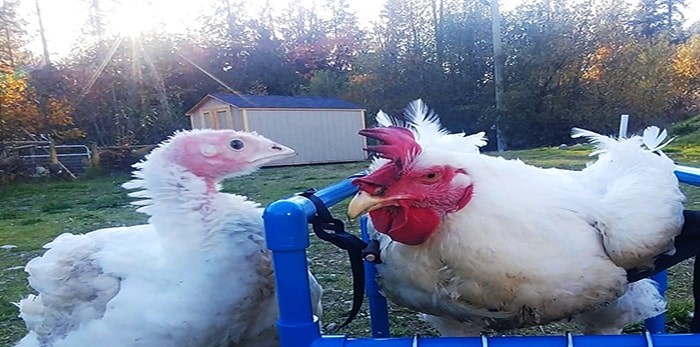The one-legged turkey that pulled at the heartstrings of many Vancouverites last Thanksgiving sadly has died. Gertie with her best friend Henry in his special chicken therapy chair. ŌĆō Michelle Singleton / @homeforhooves instagram
Gertie with her best friend Henry in his special chicken therapy chair. ŌĆō Michelle Singleton / @homeforhooves instagram
Gertie became known as B.C.ŌĆÖs luckiest turkey when she escaped becoming Thanksgiving dinner after her leg was severed in a farming accident.
While other birds raised for meat may have faced a different fate in this scenario, as luck would have it, a girl, who boarded a horse at the same farm, found Gertie and was determined to save her.
The girlŌĆÖs family took Gertie to in Duncan, B.C., which provides forever homes for rescued and abandoned farm animals.
Michelle Singleton, founder of the animal sanctuary, willingly took Gertie in to provide the bird with a better life. She began saving money for a prosthetic leg, to help with GertieŌĆÖs mobility issues.
 Gertie's leg was severed in a farming accident. Photo Michelle Singleton
Gertie's leg was severed in a farming accident. Photo Michelle Singleton
On a visit to the farm last year, Zoe Peled, founder of ┬ķČ╣┤½├Įė│╗ŁVegan Resource Centre, met Gertie and decided to help by donating part proceeds from her event "A Very Vegan Thanksgiving."
The event, last fall, raised $1,100 for the sanctuary. Singleton said the generous donation went towards not only GertieŌĆÖs prosthetic leg, but caring for the 35 animals at the farm and building a special bird run for Gertie and her best friend Henry ŌĆō a Cornish cross chicken with similar mobility issues.
Singleton confirmed with the Courier that Gertie died in her arms Dec. 1, after complications with a septic wing.
ŌĆ£It was a constant battle dealing with cuts and abrasions on her wings due to her mobility issues,ŌĆØ Singleton said.
ŌĆ£One of the cuts on her wing became infected and we had her under the care of the local farm veterinarian.ŌĆØ
Singleton explained it was extremely difficult to treat Gertie because many of the antibiotics usually used for the infection she had were prohibited for use on turkeys.
ŌĆ£The veterinarian had limited experience treating turkeys because people rarely put the effort in to treating them because they are primarily raised for meat,ŌĆØ she said.
ŌĆ£We were at the veterinarian for hours while they consulted with a specialist on how to treat her. In the end they opted to use an ŌĆśoff labelŌĆÖ antibiotic that they thought would treat the infection.ŌĆØ
 Gertie with her best friend Henry. Photo Michelle Singleton / @homeforhooves instagram
Gertie with her best friend Henry. Photo Michelle Singleton / @homeforhooves instagram
Sadly, it didnŌĆÖt work.
ŌĆ£We then took her home and I kept her in my room to keep a close eye on her,ŌĆØ Singleton said.
ŌĆ£At 4 a.m. I was awoken to her having a seizure and she died in my arms.ŌĆØ
The prosthetic leg arrived the day before she passed away. It cost $225.
To add to the saddness, Singleton said Henry was ŌĆ£never the same after Gertie was goneŌĆØ and he died a few months later.
ŌĆ£Our veterinarian said he was just tired and his body wasn't built for a long life,ŌĆØ Singleton said.
Peled said it was devastating to lose Gertie after everything she had been through.
ŌĆ£It is always devastating to lose an animal; in Gertie's case, even more so,ŌĆØ she said.
ŌĆ£She overcame so much: she survived the animal AG industry. She survived a horrible accident, the loss of a limb, and by some stroke of luck found herself at Home for Hooves.
ŌĆ£Gertie was granted an opportunity, and moreso, she deserved the years that she was offered through rescue. In her case, and in similar cases, we find some peace in knowing that for her last weeks and days, she was in a place where she was loved, treasured, and above all: regarded as an individual, not a product, and not a number."
The two birds are now buried in the sanctuaryŌĆÖs memorial garden, created after Gertie died last year.
The best friends are buried alongside Debbie, a 900-pound sow that died of cancer and also inspired the creation of the sanctuary in 2017, and two other chickens.
 The memorial garden at A Home For Hooves Animal sanctuary. Photo Michelle Singleton
The memorial garden at A Home For Hooves Animal sanctuary. Photo Michelle Singleton
The specialty made run, worth $1,000, has not gone to waste, and is now being used by other animals at the sanctuary, including ducks and chickens. Singleton said the prosthetic leg and the run would be readily available for any other disabled birds that come into her care.
Peled said she would continue to support the efforts of A Home For Hooves and had already donated a further $2,400 from an annual fundraiser held in February.
ŌĆ£Within rescue, especially within the world of rescues from the animal agriculture industries, the losses are always challenging,ŌĆØ she said.
ŌĆ£We try and move through these losses by continuing with the advocacy; to honour the animals we have lost, support the new ones, and ensure we will be able to support and provide for those of the future.ŌĆØ


